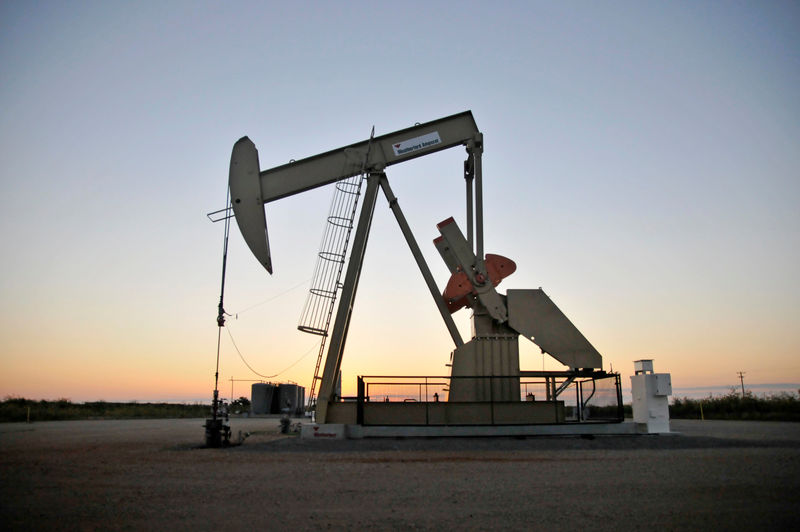 © Reuters. FILE PHOTO: A pump jack operates at a well site leased by Devon Energy Production Company near Guthrie,
© Reuters. FILE PHOTO: A pump jack operates at a well site leased by Devon Energy Production Company near Guthrie,By Scott DiSavino
NEW YORK (Reuters) – Oil prices were little changed on Monday, trading near their highest since May 2015, as political concerns in some OPEC nations offset projections for higher U.S. oil production.
“Oil prices are finely balanced in today’s trading session. Ongoing protests in Iran, together with recent detention of several princes in Saudi Arabia, have reinvigorated geopolitical concerns,” Abhishek Kumar, Senior Energy Analyst at Interfax Energy’s Global Gas Analytics in London.
“However, prospects for further increases in U.S. oil production amid recent improvements seen in oil prices continue to promote bearish sentiment,” Kumar said.
Brent futures () were up 2 cents at $67.64 a barrel by 11:58 a.m. EST, while U.S. West Texas Intermediate (WTI) crude () rose 6 cents, or 0.1 percent, to $61.50.
Last week, both contracts rose to their highest since May 2015 with Brent at $68.27 and WTI at $62.21.
U.S. production
Only Russia and Saudi Arabia produce more.
“The U.S. oil price is now into a range that is anticipated to attract increased shale oil production,” said Ric Spooner, chief market analyst at CMC Markets in Sydney.
“Traders may decide that discretion is the better part of valor while markets wait on evidence of what happens to the rig count and production levels over the next couple of months,” Spooner said.
U.S. drillers reduced the number of oil rigs operating by five in the week to Jan. 5, the first decline in three weeks, according to a report by energy services firm Baker Hughes on Friday. [RIG/U]
Rising U.S. production is the main factor countering output cuts led by the Middle East-dominated Organization of the Petroleum Exporting Countries and by Russia, which began in January 2017 and are set to last through 2018.
A senior OPEC source from a major Middle Eastern oil producer said OPEC was monitoring unrest in Iran, as well as Venezuela’s economic crisis, but will boost output only if there are significant and sustained production disruptions from those countries.[nL8N1P33B6]
Stephen Innes, head of trading for Asia/Pacific at futures brokerage Oanda in Singapore, said “the OPEC versus shale debate will rage” this year, being a key price-driving factor.
However, Innes added that Middle East turmoil would remain a key focus for oil markets and had the potential to “send oil prices rocketing higher.”
Fusion Media or anyone involved with Fusion Media will not accept any liability for loss or damage as a result of reliance on the information including data, quotes, charts and buy/sell signals contained within this website. Please be fully informed regarding the risks and costs associated with trading the financial markets, it is one of the riskiest investment forms possible.
Source: Investing.com



























